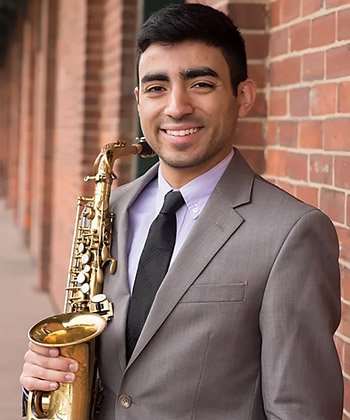by Mike Telin

On Sunday, October 31 at 5:00 pm at Christ Episcopal Church in Hudson, Gabriel Piqué and pianist Casey Dierlam Tse will perform a diverse selection of works as part of the Music From The Western Reserve series. Tickets are available online.
Piqué, who is the Assistant Professor of Saxophone and Jazz Studies at Baldwin Wallace Conservatory, will begin his program with Fernande Decruck’s Sonata in c-sharp.
“Decruck is probably best known in the saxophone community and this is her most famous piece,” Piqué said. “I played it on my masters’ recital and the piece provided a transformational moment for me. When I was an undergrad I was primarily a button pusher — a technician if you will. I had great technique but didn’t understand what music was about. My teacher at Eastman was the one who said, ‘You have emotions — you should try them.’ He was rather blunt. But this piece is the perfect vehicle for that. It doesn’t work if you’re not in-tune with your emotions.”
Piqué, who is the baritone saxophonist of the award-winning Fuego Quartet, will continue with William Grant Still’s Romance. Still was commissioned by Sigurd Rascher in 1954, making him the first African American composer to write a concert piece for saxophone and piano.
It was actually a student who introduced Piqué to Heitor Villa-Lobos’ Fantasia. “He had never played soprano sax before, but he wanted to learn it. Watching his growth during the semester was inspiring to me. So I thought, I know it, but I’ve never played it on a program.”
When looking at the titles of works by Australian saxophonist/composer Barry Cockcroft, you notice a pattern. There’s Rock Me!, Beat Me, Blow Down, Slap Me, and Black and Blue. Piqué noted that there’s a reason for that. “He writes music that incorporates a lot of slap-tonguing, hence the aggressive titles. I’m playing Rock Me! It’s a piece designed to imitate an Australian rock band — drum set, electric guitar, didgeridoo, synthesizer, and sprinkled throughout is an acoustic saxophone. It’s mostly cool sound effects and using the instrument in ways that Adolph Sax would have never imagined. It has a lot of extended techniques, but it’s approachable — I play it everywhere I go.”
Next up will be J.S. Bach’s “Adagio” from Violin Sonata No. 1 in g. “I was the first prize winner of the North American Saxophone Alliance Solo Competition in 2016, and this is one of the pieces that I played. I also played it a couple of years ago at my grandma’s funeral. She heard me practice it for years and I thought it was fitting that I play it for her one last time.”
The saxophonist said that Andy Scott’s Paquito is an homage to the great saxophonist, clarinetist, and composer Paquito D’Rivera. “I am a person of color, I am Hispanic, and this is the music that I grew up with — it wasn’t Brahms and Beethoven. The sounds in my house were Paquito D’Rivera, Tito Puente, Dizzy Gillespie, and a lot of the Afro-Cuban sounds.”
Piqué’s program will also include Amy Beach’s Romance. “The same student who brought in the Villa-Lobos also brought in this piece and I thought, this is some of the most beautiful music I have ever heard. It’s stunning, and being a violin transcription, it’s difficult, but it’s an arrangement that is idiomatic to the saxophone.”
In honor of Halloween, the saxophonist will conclude the program with his own arrangement of Saint-Saëns’ Danse Macabre.
During our conversation Gabriel Piqué’s excitement for what he does comes through very well, especially when it comes to collaborating with friends. “I consider Casey [Dierlam Tse] to be one of my best friends, and one of the best saxophone accompanists today. She’s at every saxophone conference — I don’t know how she got into it but she loves it and does it better than everybody. I’m thankful for Music From The Western Reserve for flying her in. She’s also giving a clinic at BW.”
In addition to the Fuego Quartet, Piqué also plays alto in the critically acclaimed touring saxophone sextet The Moanin’ Frogs. He noted that the two ensembles are representative of his experiences in the saxophone community.
“We’re friends first, which is probably the most important aspect of being in a professional group. We spend so much time together, whether it’s touring or in meetings discussing our future. We all come from very different pedagogical backgrounds, so we do have musical discussions and have different ideas, but I think that adds to the strengths of those groups because we all respect those differences. We always try to learn from each other. We all lift each other up — it’s the tide that raises all ships.”
Piqué is happy that the saxophone and sax ensembles are now getting their due in the classical music world. “The music is fresh and relevant. And we don’t have a long, storied history of repertoire which I think plays to our advantage. It allows us to explore more wild sounds. It’s totally a sign of the times that we live in.”
Published on ClevelandClassical.com October 26, 2021.
Click here for a printable copy of this article



